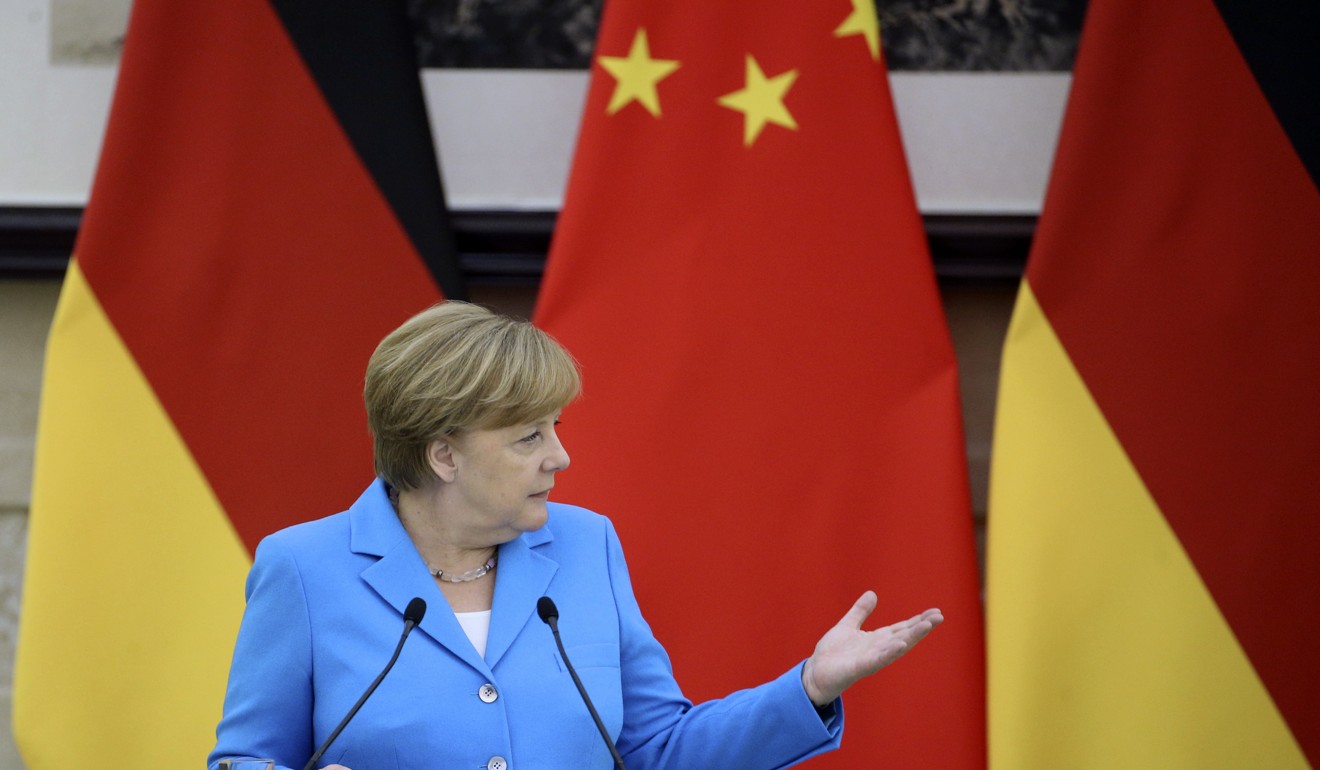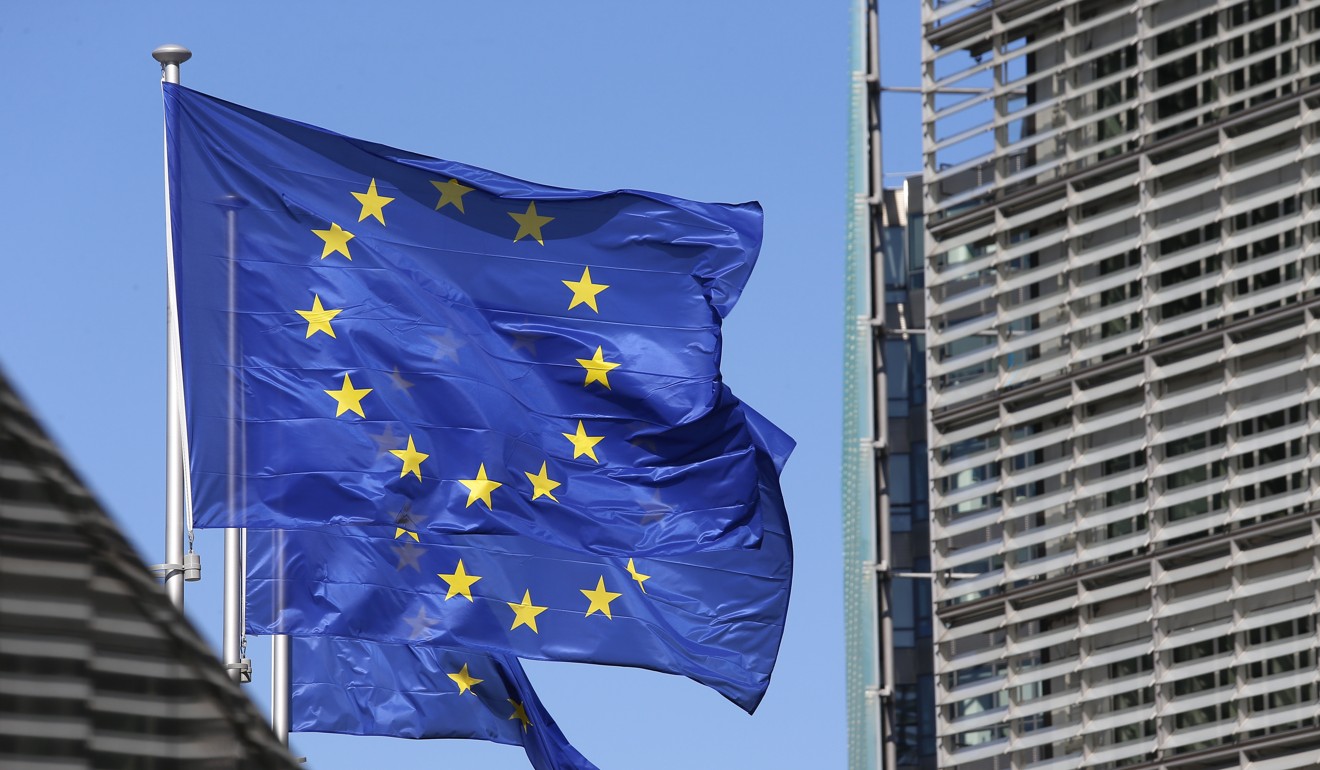
Why Europe is pivotal player for China in a three-way trade puzzle
With Beijing-EU talks expected this month, and EU, US and Chinese interests interlinked, taking one side in each battleground risks alienating the third party
China should collaborate on multiple fronts to work through a three-way stand-off over trade between Beijing, Brussels and Washington, observers and diplomats have said.
The need for a strategic balancing act has gained fresh urgency with Beijing and the European Union (EU) to hold high-level economic talks on June 25, according to a European source, after dialogue due last year was delayed.
The two sides would also soon start a new round of talks on what would form the Comprehensive Agreement on Investment, covering market openness, the source said.
China lifts EU hopes with ‘political commitment’ to expand market access
There had been signs that Beijing and Brussels were ready to engage over trade and investment since Chinese Vice-Premier Liu He and European Commission Vice-President Jyrki Katainen agreed on May 24 to hold economic dialogue as soon as possible, but the discussions will have a complex backdrop.
The EU and the United States hold similar positions on uneven intellectual property treatment and the slow pace of opening up market access in China, but have been in dispute on aeroplane subsidies for more than a decade.
Will Trump’s tariffs on allies be the start of a global trade war?
The EU and China share common concerns on the unilateral trade actions taken by the US, and its exit from the climate change accord and the Iran nuclear deal, but have long disputes on industrial overcapacity and anti-dumping rules.
“The situation is very complicated because the interests and conflicts of three parties intertwine,” said Cui Hongjian, a senior fellow with China Institute of International Studies. “It is not a simple friend-or-foe question.”
Bourbon, blue jeans and steel: here’s how the EU will fight US trade war
In the trade friction with the US, China has positioned itself as a defender of the multilateral global trade system and recently talked up a belief that joint efforts with the EU are necessary in countering the protectionism of Donald Trump’s US administration.
A diplomatic source said EU members were watching the US-China trade talks closely and were concerned about being squeezed out of the Chinese market if a deal was reached on large-scale Chinese purchase of US products.

The EU, facing deepening rifts with the US, political uncertainties in Italy and increasing internal conflicts among member states, has carefully sought a balance with the other two parties.
There are clear lines being drawn where China could find itself on the side of Europe, with the US on the other side
“Right now, the way the Trump administration is behaving on matters from trade to climate to Middle East peace, there are clear lines being drawn where China could find itself on the side of Europe, with the US on the other side,” said Robert Carnell, ING Bank’s head of research for Asia-Pacific.
“On an economic front, a series of trade tariff reductions and expansion of ‘Belt and Road Initiative’ projects with Europe could provide a win-win for both Europe and China.
China reaches out to Germany to ease worries about eastern Europe foray
“But there remains an element of mistrust between China and Europe that stems, in my view, mainly from the US being Europe’s historic ally in both economic and military areas, and from China’s viewpoint, it not being clear who the go-to person was in Europe: [German Chancellor] Angela Merkel or [European Commission President] Jean-Claude Juncker?”
The EU raised a complaint with the World Trade Organisation (WTO) on June 1 against what it says is China’s unfair requirement of technology transfer, putting itself in one camp with the US, which filed a similar dispute with the WTO in March following a probe of China’s trade and technology practices.
Meanwhile, the EU also filed a WTO dispute over the steel and aluminium tariffs imposed by the US, and threatened to impose tariffs on US products as a countermeasure.
However, the union issued a joint statement with the US and Japan vowing to jointly set higher standards on state subsidies and state-owned enterprises than the existing WTO rules do, apparently targeting China.
China ‘regrets’ EU’s allegation of intellectual property theft
Concern about intellectual property (IP) protection has been one of the issues raised by the EU for years, but teaming up with US actions through the WTO on China’s IP practices had also been one of the conditions for the EU to earn an exemption from steel and aluminium tariffs from the US, and it had been suggested inside the EU that it should solve the issue with the US by targeting China’s overcapacity, said Cui.
Peking University international relations professor Zha Daojing said the WTO was designed to function as a venue for continuous bargaining by and among its member states and “it is just procedural for the EU to take China to the WTO and vice versa”.
Belt and road is no 'win-win' for China's partners: US study
He said that on some issues any two of the three shared similar concerns, “so the trio just need to keep working at it at the WTO: it is the lowest common denominator. There is not that much of two members ganging up against one.”
Despite the deepening rift across the Atlantic, the EU was trying not to take a side with China or with the US on the trade front, while it had urged Beijing to abide by international rules on economic and geopolitical fronts rather than taking “assertive” actions, the diplomatic source said.
Beijing and Brussels will hold their annual high-level summit in July, and the annual cabinet-level meeting between Beijing and Berlin will be held in the same month.
Merkel warns against China's influence in Balkans
Cui said the EU had limited scope to reshape transatlantic relations because of hefty reliance on the US on security issues, and it was more anxious than China to reinforce bilateral cooperation while being wary of mounting competition from China.
“China should not only deal with the EU authorities but also manage relations with big member countries,” he said. “China has many partners in Europe that share common interests.”
Beijing and Brussels have become more confrontational in recent years on a wide range of issues, including manufacturing overcapacity, market access, investment scrutiny, the South China Sea and human rights.
France, Britain to sail warships in South China Sea to challenge Beijing
The defence ministers of France and Britain said in Singapore over the weekend that they would sail warships through the South China Sea to challenge Beijing’s expanding military presence in the disputed waters.
Discontent about the lack of investment reciprocity in China is widely believed to be a major factor in the EU’s recent efforts to promote scrutiny of inbound investment. The EU and European companies have urged Beijing to reduce investment barriers, while Chinese companies have enjoyed much greater freedom to invest in Europe.
In her visit to China late last month, Merkel made clear that Chinese investment continued to be welcome, said Michael Clauss, the German ambassador to China, adding that Germany remains one of the most open markets for foreign investment.

“However, such an exceptionally high degree of openness requires greater reciprocity from the Chinese side to be sustainable,” he said.
Another issue is a growing wariness in the European bloc of China’s increasing economic presence and influence in central European countries, and the accusation that China is using a divide-and-rule tactic to push its global “Belt and Road Initiative” agenda in the region.
Is China’s investment driving Western Balkan nations into debt?
Major European countries have refrained from solid endorsements of the initiative but have urged China to keep projects transparent and open for foreign players.
The same diplomatic source said that western European countries could have a “scrutinising role” in ensuring belt and road projects abide by rules and regulations.
Additional reporting by Catherine Wong

